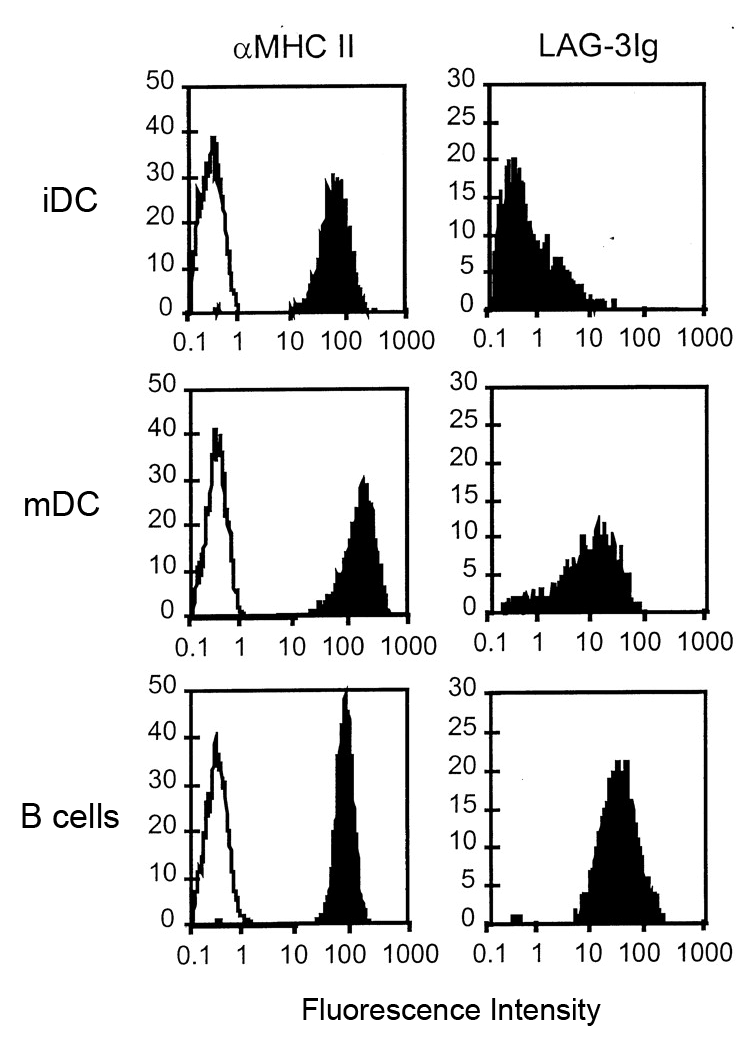LAG-3 (human):Fc (human) (rec.)
| Code | Size | Price |
|---|
| AG-40B-0031-C050 | 50 ug | £290.00 |
Quantity:
Prices exclude any Taxes / VAT
Overview
Host Type: Hamster
Regulatory Status: RUO
Target Species:
- Human
- Monkey
- Mouse
Shipping:
Blue Ice
Storage:
-20°C
Images
Documents
Further Information
Alternate Names/Synonyms:
Lymphocyte Activation Gene-3; FDC Protein; CD223
Biological Activity:
Inhibits binding of MAb to LAG-3 (human) to LAG-3. Induces maturation of human dendritic cells.
Concentration:
0.5 mg/ml
EClass:
32160000
Endotoxin:
<0.001EU/µg purified protein (LAL test; Lonza).
Form (Short):
liquid
Formulation:
Liquid. In PBS containing 5mM arginine.
Handling Advice:
After opening, prepare aliquots and store at -20°C.Avoid freeze/thaw cycles.PBS containing at least 0.1% BSA should be used for further dilutions.
Long Description:
Protein. The sequence coding for the 4 extracellular Ig-like domains of human LAG-3 (D1-D4) is fused to the Fc portion of human IgG1. Source: CHO cells. Endotoxin content: <0.1EU/µg purified protein (LAL test; Lonza). Liquid. In PBS. Binds to human, mouse and monkey MHC class II. Purity: >99% (SDS-PAGE). Lymphocyte activation gene 3 (LAG-3; CD223) plays an important role in negatively regulating T cell proliferation, function and homeostasis. It is required for maximal natural and induced regulatory T cell (Treg) function. LAG-3 is closely related to the T cell co-receptor CD4 and binds to MHC class II molecules but with a significantly higher affinity than CD4.
Molecular Weight:
~80kDa (SDS-PAGE)
NCBI, Uniprot Number:
P18627
Other data:
Application: Flow Cytometry: Detection of MHC class II molecules in combination with fluorescently labeled antibodies to IgG1. Uni-Prot link P18627: LAG-3 (human) http://www.uniprot.org/uniprot/P18627 .
Package Type:
Plastic Vial
Product Description:
Lymphocyte activation gene 3 (LAG-3; CD223) plays an important role in negatively regulating T cell proliferation, function and homeostasis. It is required for maximal natural and induced regulatory T cell (Treg) function. LAG-3 is closely related to the T cell co-receptor CD4 and binds to MHC class II molecules but with a significantly higher affinity than CD4.
Purity:
>99% (SDS-PAGE)
Sequence:
The sequence coding for the 4 extracellular Ig-like domains of human LAG-3 (D1-D4) is fused to the Fc portion of human IgG1.
Source / Host:
CHO cells
Specificity:
Binds to human, mouse and monkey MHC class II.
TAGs:
Fc
Transportation:
Non-hazardous
UNSPSC Category:
Other Proteins
UNSPSC Number:
12352202
Use & Stability:
Stable for at least 6 months after receipt when stored at -20°C. Working aliquots are stable for up to 3 months when stored at -20°C. Contains arginine for optimized protein stability.
References
CD4/major histocompatibility complex class II interaction analyzed with CD4- and lymphocyte activation gene-3 (LAG-3)-Ig fusion proteins: B. Huard, et al.; Eur. J. Immunol. 25, 2718 (1995) | T cell major histocompatibility complex class II molecules down-regulate CD4+ T cell clone responses following LAG-3 binding: B. Huard, et al.; Eur. J. Immunol. 26, 1180 (1996) | Maturation and activation of dendritic cells induced by lymphocyte activation gene-3 (CD223): S. Andreae, et al.; J. Immunol. 168, 3874 (2002) | LAG-3 (CD223) reduces macrophage and dendritic cell differentiation from monocyte precursors: S. Buisson & F. Triebel; Immunology 114, 369 (2005) | A soluble lymphocyte activation gene-3 (sLAG-3) protein as a prognostic factor in human breast cancer expressing estrogen or progesterone receptors: F. Triebel, et al.; Cancer Lett. 235, 147 (2006) | A soluble form of lymphocyte activation gene-3 (IMP321) induces activation of a large range of human effector cytotoxic cells: C. Brignone, et al.; J. Immunol. 179, 4202 (2007)



